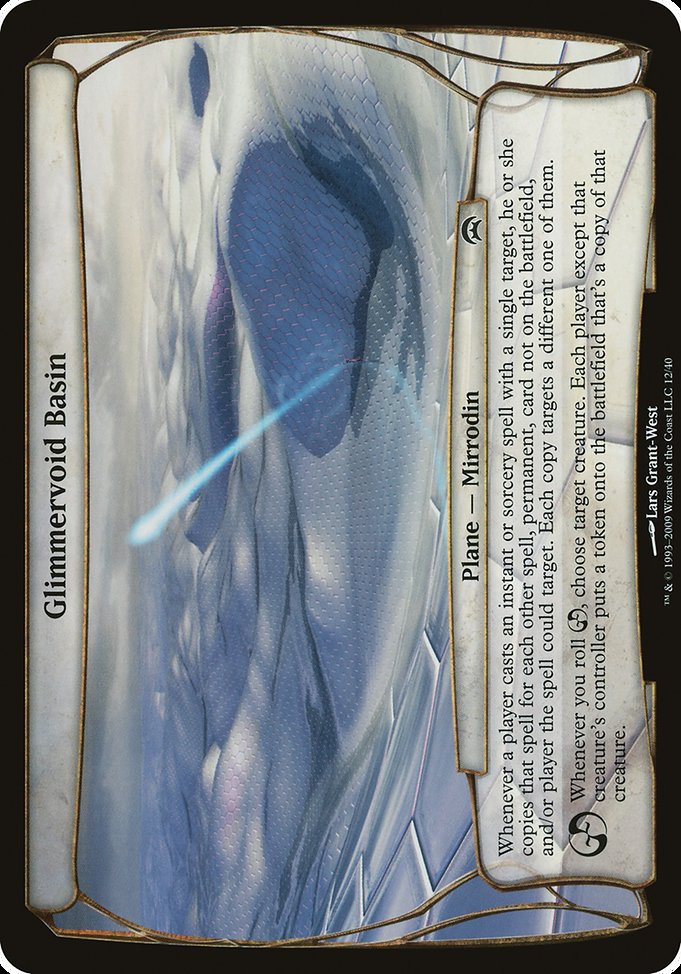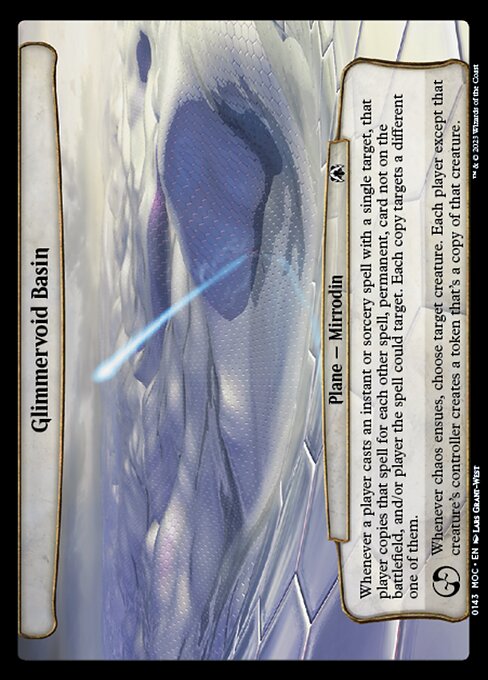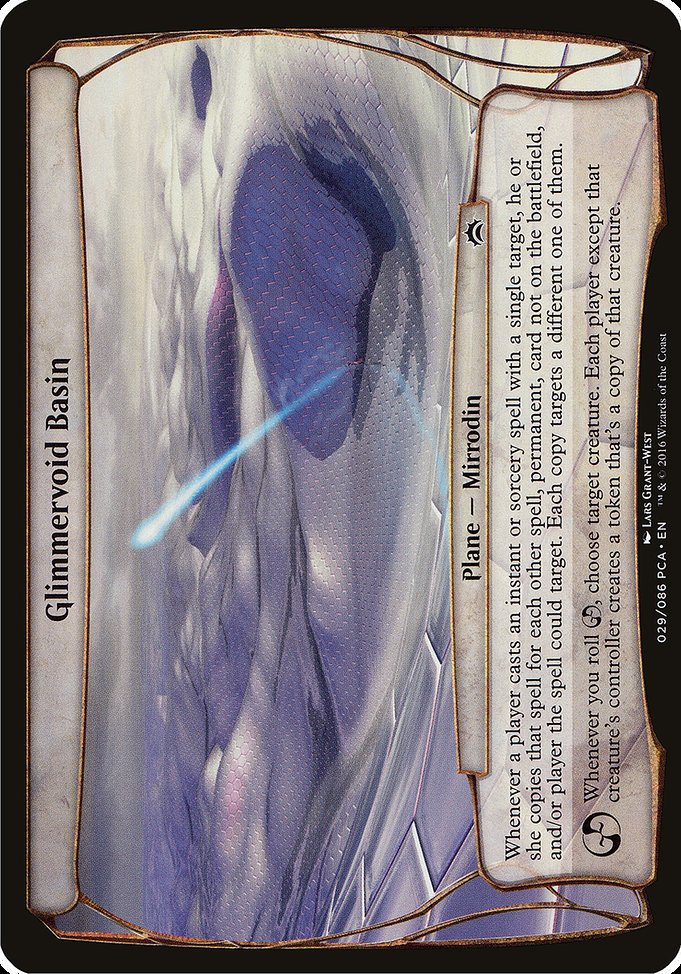standard
future
historic
gladiator
pioneer
explorer
modern
legacy
pauper
vintage
penny
commander
brawl
historicbrawl
alchemy
paupercommander
duel
oldschool
premodern
Rulings
If a spell targets multiple things, it won’t cause Glimmervoid Basin’s first ability to trigger, even if all but one of those targets has become illegal.
The controller of the spell that caused Glimmervoid Basin’s first ability to trigger also controls all the copies. That player chooses the order the copies are put onto the stack. The original spell will be on the stack beneath those copies and resolves last.
As a token is created by the chaos ability, it checks the printed values of the creature it’s copying, as well as any copy effects that have been applied to it. It won’t copy counters on the creature, nor will it copy other effects that have changed the creature’s power, toughness, types, color, and so on.
A face-up plane card that’s turned face down becomes a new object with no relation to its previous existence. In particular, it loses all counters it may have had.
If the spell that’s copied is modal (that is, it says “Choose one —” or the like), the copy will have the same mode. Its controller can’t choose a different one.
A plane card is treated as if its text box included “When you roll {PW}, put this card on the bottom of its owner’s planar deck face down, then move the top card of your planar deck off that planar deck and turn it face up.” This is called the “planeswalking ability.”
If a spell targets the same player or object multiple times, it won’t cause Glimmervoid Basin’s first ability to trigger.
The controller of a face-up plane card is the player designated as the “planar controller.” Normally, the planar controller is whoever the active player is. However, if the current planar controller would leave the game, instead the next player in turn order that wouldn’t leave the game becomes the planar controller, then the old planar controller leaves the game. The new planar controller retains that designation until they leave the game or a different player becomes the active player, whichever comes first.
The copies that Glimmervoid Basin’s first ability creates are created on the stack, so they’re not “cast.” Abilities that trigger when a player casts a spell (like Glimmervoid Basin’s first ability itself) won’t trigger.
Other than choices involving modes or additional costs, the copies are created based on what they could target if the spell were cast anew. For example, if a player casts Naturalize (“Destroy target artifact or enchantment”) targeting an artifact, Glimmervoid Basin’s first ability will copy it for each artifact and enchantment it could target (and each copy will target a different one of those), not just for each artifact it could target.
If an ability of a plane refers to “you,” it’s referring to whoever the plane’s controller is at the time, not to the player that started the game with that plane card in their deck. Many abilities of plane cards affect all players, while many others affect only the planar controller, so read each ability carefully.
Anything that couldn’t be targeted by the original spell (due to shroud, protection abilities, targeting restrictions, or any other reason) is just ignored by Glimmervoid Basin’s first ability.
If the spell that’s copied has an X whose value was determined as it was cast (like Earthquake does), the copy has the same value of X.
The controller of a copy can’t choose to pay any additional costs for the copy. However, effects based on any additional costs that were paid for the original spell are copied as though those same costs were paid for the copy too.
The controller of the spell that caused Glimmervoid Basin’s first ability to trigger also controls all the copies. That player chooses the order the copies are put onto the stack. The original spell will be on the stack beneath those copies and resolves last.
As a token is created by the chaos ability, it checks the printed values of the creature it’s copying, as well as any copy effects that have been applied to it. It won’t copy counters on the creature, nor will it copy other effects that have changed the creature’s power, toughness, types, color, and so on.
A face-up plane card that’s turned face down becomes a new object with no relation to its previous existence. In particular, it loses all counters it may have had.
If the spell that’s copied is modal (that is, it says “Choose one —” or the like), the copy will have the same mode. Its controller can’t choose a different one.
A plane card is treated as if its text box included “When you roll {PW}, put this card on the bottom of its owner’s planar deck face down, then move the top card of your planar deck off that planar deck and turn it face up.” This is called the “planeswalking ability.”
If a spell targets the same player or object multiple times, it won’t cause Glimmervoid Basin’s first ability to trigger.
The controller of a face-up plane card is the player designated as the “planar controller.” Normally, the planar controller is whoever the active player is. However, if the current planar controller would leave the game, instead the next player in turn order that wouldn’t leave the game becomes the planar controller, then the old planar controller leaves the game. The new planar controller retains that designation until they leave the game or a different player becomes the active player, whichever comes first.
The copies that Glimmervoid Basin’s first ability creates are created on the stack, so they’re not “cast.” Abilities that trigger when a player casts a spell (like Glimmervoid Basin’s first ability itself) won’t trigger.
Other than choices involving modes or additional costs, the copies are created based on what they could target if the spell were cast anew. For example, if a player casts Naturalize (“Destroy target artifact or enchantment”) targeting an artifact, Glimmervoid Basin’s first ability will copy it for each artifact and enchantment it could target (and each copy will target a different one of those), not just for each artifact it could target.
If an ability of a plane refers to “you,” it’s referring to whoever the plane’s controller is at the time, not to the player that started the game with that plane card in their deck. Many abilities of plane cards affect all players, while many others affect only the planar controller, so read each ability carefully.
Anything that couldn’t be targeted by the original spell (due to shroud, protection abilities, targeting restrictions, or any other reason) is just ignored by Glimmervoid Basin’s first ability.
If the spell that’s copied has an X whose value was determined as it was cast (like Earthquake does), the copy has the same value of X.
The controller of a copy can’t choose to pay any additional costs for the copy. However, effects based on any additional costs that were paid for the original spell are copied as though those same costs were paid for the copy too.
Rulings
If a spell targets multiple things, it won’t cause Glimmervoid Basin’s first ability to trigger, even if all but one of those targets has become illegal.
The controller of the spell that caused Glimmervoid Basin’s first ability to trigger also controls all the copies. That player chooses the order the copies are put onto the stack. The original spell will be on the stack beneath those copies and resolves last.
As a token is created by the chaos ability, it checks the printed values of the creature it’s copying, as well as any copy effects that have been applied to it. It won’t copy counters on the creature, nor will it copy other effects that have changed the creature’s power, toughness, types, color, and so on.
A face-up plane card that’s turned face down becomes a new object with no relation to its previous existence. In particular, it loses all counters it may have had.
If the spell that’s copied is modal (that is, it says “Choose one —” or the like), the copy will have the same mode. Its controller can’t choose a different one.
A plane card is treated as if its text box included “When you roll {PW}, put this card on the bottom of its owner’s planar deck face down, then move the top card of your planar deck off that planar deck and turn it face up.” This is called the “planeswalking ability.”
If a spell targets the same player or object multiple times, it won’t cause Glimmervoid Basin’s first ability to trigger.
The controller of a face-up plane card is the player designated as the “planar controller.” Normally, the planar controller is whoever the active player is. However, if the current planar controller would leave the game, instead the next player in turn order that wouldn’t leave the game becomes the planar controller, then the old planar controller leaves the game. The new planar controller retains that designation until they leave the game or a different player becomes the active player, whichever comes first.
The copies that Glimmervoid Basin’s first ability creates are created on the stack, so they’re not “cast.” Abilities that trigger when a player casts a spell (like Glimmervoid Basin’s first ability itself) won’t trigger.
Other than choices involving modes or additional costs, the copies are created based on what they could target if the spell were cast anew. For example, if a player casts Naturalize (“Destroy target artifact or enchantment”) targeting an artifact, Glimmervoid Basin’s first ability will copy it for each artifact and enchantment it could target (and each copy will target a different one of those), not just for each artifact it could target.
If an ability of a plane refers to “you,” it’s referring to whoever the plane’s controller is at the time, not to the player that started the game with that plane card in their deck. Many abilities of plane cards affect all players, while many others affect only the planar controller, so read each ability carefully.
Anything that couldn’t be targeted by the original spell (due to shroud, protection abilities, targeting restrictions, or any other reason) is just ignored by Glimmervoid Basin’s first ability.
If the spell that’s copied has an X whose value was determined as it was cast (like Earthquake does), the copy has the same value of X.
The controller of a copy can’t choose to pay any additional costs for the copy. However, effects based on any additional costs that were paid for the original spell are copied as though those same costs were paid for the copy too.
The controller of the spell that caused Glimmervoid Basin’s first ability to trigger also controls all the copies. That player chooses the order the copies are put onto the stack. The original spell will be on the stack beneath those copies and resolves last.
As a token is created by the chaos ability, it checks the printed values of the creature it’s copying, as well as any copy effects that have been applied to it. It won’t copy counters on the creature, nor will it copy other effects that have changed the creature’s power, toughness, types, color, and so on.
A face-up plane card that’s turned face down becomes a new object with no relation to its previous existence. In particular, it loses all counters it may have had.
If the spell that’s copied is modal (that is, it says “Choose one —” or the like), the copy will have the same mode. Its controller can’t choose a different one.
A plane card is treated as if its text box included “When you roll {PW}, put this card on the bottom of its owner’s planar deck face down, then move the top card of your planar deck off that planar deck and turn it face up.” This is called the “planeswalking ability.”
If a spell targets the same player or object multiple times, it won’t cause Glimmervoid Basin’s first ability to trigger.
The controller of a face-up plane card is the player designated as the “planar controller.” Normally, the planar controller is whoever the active player is. However, if the current planar controller would leave the game, instead the next player in turn order that wouldn’t leave the game becomes the planar controller, then the old planar controller leaves the game. The new planar controller retains that designation until they leave the game or a different player becomes the active player, whichever comes first.
The copies that Glimmervoid Basin’s first ability creates are created on the stack, so they’re not “cast.” Abilities that trigger when a player casts a spell (like Glimmervoid Basin’s first ability itself) won’t trigger.
Other than choices involving modes or additional costs, the copies are created based on what they could target if the spell were cast anew. For example, if a player casts Naturalize (“Destroy target artifact or enchantment”) targeting an artifact, Glimmervoid Basin’s first ability will copy it for each artifact and enchantment it could target (and each copy will target a different one of those), not just for each artifact it could target.
If an ability of a plane refers to “you,” it’s referring to whoever the plane’s controller is at the time, not to the player that started the game with that plane card in their deck. Many abilities of plane cards affect all players, while many others affect only the planar controller, so read each ability carefully.
Anything that couldn’t be targeted by the original spell (due to shroud, protection abilities, targeting restrictions, or any other reason) is just ignored by Glimmervoid Basin’s first ability.
If the spell that’s copied has an X whose value was determined as it was cast (like Earthquake does), the copy has the same value of X.
The controller of a copy can’t choose to pay any additional costs for the copy. However, effects based on any additional costs that were paid for the original spell are copied as though those same costs were paid for the copy too.
Votre collection ? vos decks ?
Envie de gérer votre collection et/ou créer des decks ?



 0
0
 0.40€
0.40€
